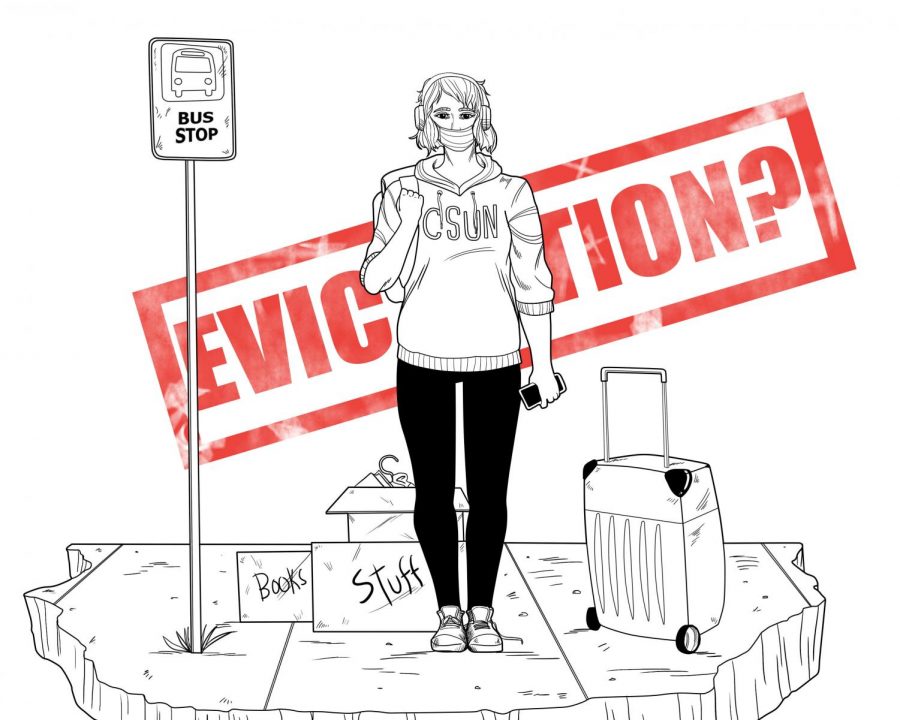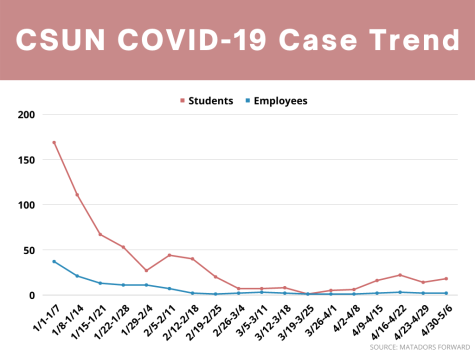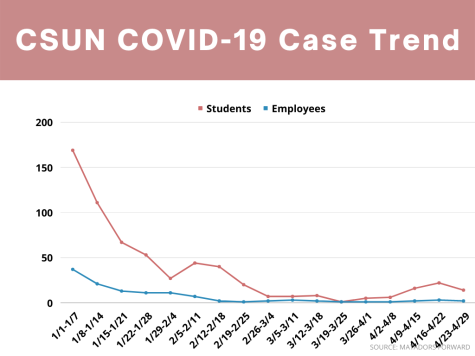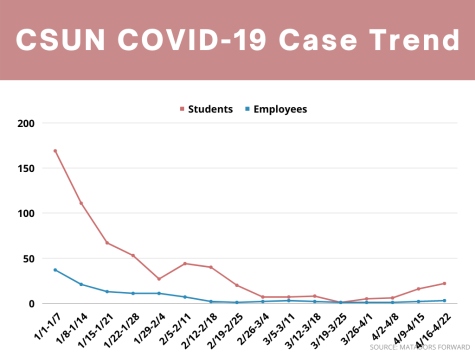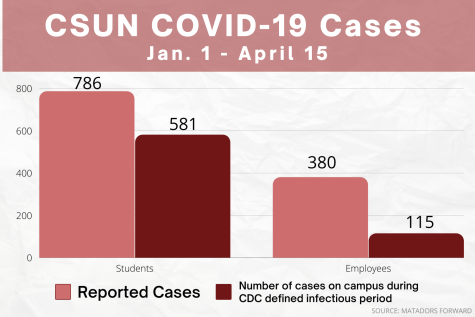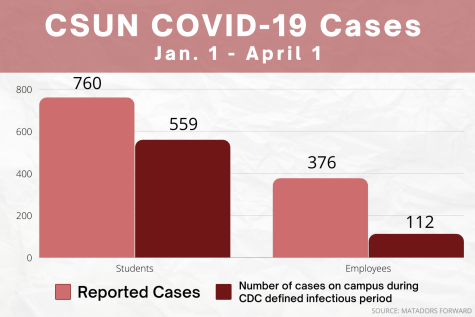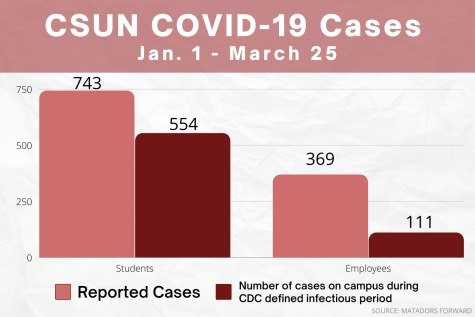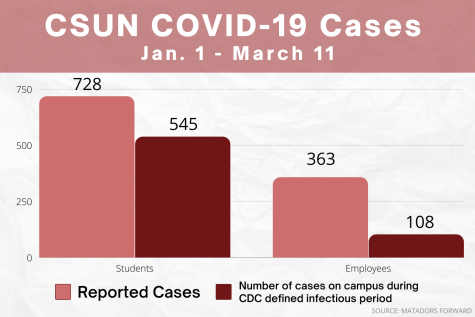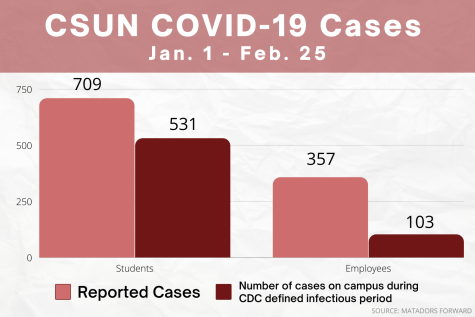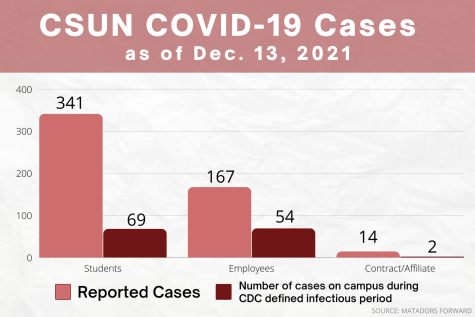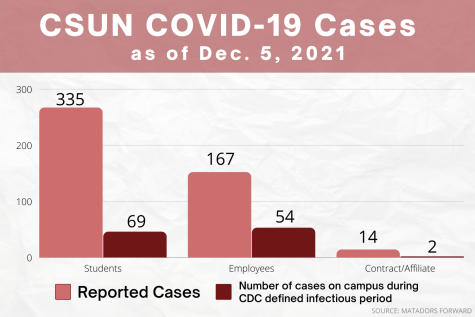Renters rights: California orders protect tenants from evictions during the coronavirus pandemic
May 5, 2020
A home is more than just its walls, roof and windows — it’s supposed to be a space where people feel most at peace.
For Holly Lin, it was her home away from home that served as a sanctuary, as it provided her with the necessary amount of room to nurture her mental and physical development, a quality her family home couldn’t offer. While in pursuit of her education at CSUN, she found her second home in a house rental that she shared with four other students and her landlord in 2018.
“It was the first time I’ve ever experienced living on my own and having my own room,” Lin said. “My room was actually bigger than the room that my whole family was living in. It was a place that I could come home to and be alone. It was a stable place I knew I would be safe. It helped me keep my sanity.”
Two years later, she found herself in threat of losing the sanctuary she became accustomed to, while attempting to shelter-in-place.
In March, five CSUN student tenants received communication through text message from their landlord, followed by a letter, which asked them to move out by April. One of those tenants was Lin.
Tenants were given the initial text message and letter on different dates, but received one of the two forms of communication by March 20, seemingly giving them at least 11 days to make new living arrangements.
The tenants believed the letter was an official eviction notice and eventually moved out.
Local and state orders were put in place to slow the spread of the virus and in the process, they should in theory act to avoid the displacement of tenants from evictions during this wide-spread pandemic. But some landlords are continuing to threaten tenants with unlawful evictions, despite these orders, and tenants may end up voluntarily vacating to comply with the suspected notice because they don’t know their rights as tenants.
“I think now, more than before the pandemic and crisis hit, people need to inform and educate themselves on what their rights are, not only generally, but also specifically to the circumstances — informing themselves on what the local ordinances say and do and understanding what the county and state protections are,” said Jorge Rivera, the Southern California Regional Coordinator of Tenants Together.
California Gov. Gavin Newsom issued an executive order on March 16 that halts evictions through May 31. The order requires tenants to notify their landlords within seven days of the rent’s due date and to provide a written declaration that they were affected financially because of COVID-19.
Additionally, Los Angeles Mayor Eric Garcetti issued an emergency order on March 23 that protects tenants from evictions during the local emergency period in response to COVID-19 by allowing no tenancies to be terminated until 60 days after the emergency order expiration, which had been extended to April 19.
“Residential tenants in the City of Los Angeles may not be evicted during the declared local emergency in the City of Los Angeles if the eviction is a ‘no-fault eviction’ and any member of the household is ill, in isolation, or under quarantine,” the emergency order stated.
Huaian Wang, also known as Ann to her tenants, was Lin’s landlord. She and her tenants lived under the same roof. When the coronavirus concerns grew nationally and globally, the tenants said Wang’s fear of contagion led her to give them the letters, which led them to believe they were being evicted.
“The letter just explains the dangers of the situation,” Wang said. “I would never force my tenants to move out. They’re adults, they can make up their own mind about moving out.”
The letter, addressed to all tenants, read: “The coronavirus is getting worse and worse. We live in the same house, breath(e) the same air, touch the same washing machine. This is a dangerous situation. If one person is infected then many will be infected … So I ask all tenants to move out of this unsafe place as soon as possible, no later than April. From now on, everyone stays at home unless it is necessary. This is also ordered by the government!!!”
Wang insisted the letter was not intended as an eviction notice, rather a suggestion that they move out for social distancing purposes.
“I don’t know what the difference between encouraging tenants to move out and evicting them — I don’t know where the difference lies there,” Rivera said. “It sounds like pretty much the same thing. Maybe the property owner didn’t take the actual legal steps to legally evict them, but there might have been heavy encouragement to get them out.”
Rivera said tenants who believe they’re under threat of an eviction while sheltering-in-place should be familiar with the current tenant protections.
“If they were better informed and supported by someone more knowledgeable, they wouldn’t have moved out because there was no need for them to,” Rivera said. “Social distancing is not a valid reason to evict somebody, again, not to mention the fact that they cannot be legally evicted at the moment.”
Although the letter may not be considered unlawful, attorney Alexandra Hong said in an email interview that fliers like Wang’s letter could be considered harassment and breach of quiet enjoyment, depending on how many letters and other actions were taken by the landlord like frequent calls and threats.
“Under current law, regardless if there is a protection in place, landlords cannot just say you have to leave, which is essentially what is in this letter,” said Hong, who has worked with multiple organizations, such as the Eviction Defense Network, Inner City Law Center and BASTA, Inc., on defending tenants’ rights. She has been a member of the National Lawyers Guild’s Los Angeles Chapter since 2016, and is currently representing clients at Hadsell Stormer Renick & Dai LLP., through her position in the Legal Fund.
She said one of the first actions a tenant should take when addressing a suspected eviction notice is responding to the letter to establish the landlord’s motive.
“Once a tenant receives this type of letter, they should communicate in writing and ask the landlord what it is they want,” Hong said. “It is not our job as tenants to educate the landlords — it is our job to know our rights. Plus, the written communication from the landlord would support a lawsuit either as defense in eviction or supporting a cause of action to sue the landlord if the landlord continues to harass and bully the tenant into thinking the only choice is leaving.”
Unofficial letters are mistaken for real eviction notices all the time, according to Rivera. He said Tenants Together does “know your rights” training aimed to educate people on the various types of notices and how to differentiate them from an actual eviction notice.
“Now, these are exactly as the title implies — they are just notices, but a lot of folks define those as eviction notices, and in some way they’re right, in that the notice is notifying them that an eviction might take place,” Rivera said. “But an actual eviction is the legal process by which a property owner might get a tenant out of the unit and that has to go through the court system.”
Hong advises tenants to seek resources available to them if they are unsure of their rights.
“If a tenant is confused, they should always reach out to an attorney or tenants rights organization for guidance,” Hong said. “BASTA and EDN are two non-profit legal service agencies that are always willing to give free consultations. There are several tenants rights groups in Southern California that could also provide guidance — Tenants Together, the Los Angeles Tenants Union, SAJE, Inquilinos Unidos, and CES. Many of the tenants rights groups hold weekly/monthly meetings and clinics that offer free legal information and a place to organize around unfair landlord practices. If the tenant feels very intimidated and the harassment becomes unbearable, I recommend obtaining a restraining order to keep the landlord away.”
Sandra Leyva, one of the CSUN student tenants, had been living in the house for four years. To her, it was more than just a rental. So when Wang asked tenants to stay at home in the letter, she felt like she was already there.
“She told us to go home, but that was our home,” Leyva said. “She kicked us out.”
Lin moved into the house two years after Leyva. Looking back now, she could have never expected to be in this state of uncertainty.
“The thought of getting evicted was huge,” Lin said. “What kind of student ever thinks they’re going to get evicted? It was an out-of-this-world thing for me.”
Lin described Wang as “paranoid,” revealing a side of her that Lin had not seen before.
“I never realized that she was that kind of person — someone that would go to that extreme,” Lin said. “I saw her as a regular person before, not just as a landlord. So when this all happened, I had forgotten that she was a landlord, first and foremost. Her intentions were always to protect herself. She thought her life was more important than five other students’ lives.”
Wang said she’s not alone in feeling fearful of the coronavirus.
“We’re all scared of the virus,” Wang said. “It makes everything very difficult. We can try to control it by washing and keeping distance, but if we don’t follow these rules, we may die.”
Leyva said communication with Wang became difficult after the letter was distributed.
“She was so evasive,” Leyva said. “Everytime we pointed out what she was doing was illegal, she would just rant about how we should all save ourselves. It was not possible for us to have a calm, direct conversation. She was just really scared.”
Similarly, Lin said that she was unsuccessful in communicating to Wang why she needed to stay.
“She tried to invalidate me when I would try to tell her about my situation and why I couldn’t go back home,” Lin said. “She only cared about her own life and didn’t care that all of us didn’t have anywhere to go. It really showed her individualistic tendencies.”
Lin’s family home in San Francisco is a one-room apartment that houses her parents and her sister. They share a kitchen with a floor that houses six different families, including her own. She decided not to travel back to the Bay Area, because her living situation was not ideal for social distancing.
In hindsight, Lin said the mental toll and stress from receiving the letter prevented her from taking legal action and admits that the experience had tested her resiliency.
“Since getting the eviction notice, I was crying every night thinking, ‘Why is this happening to me?’” Lin said. “I actually cried so much, I got bored of crying. I was like, ‘I don’t even want to cry today.’ It was just a burden on me.”
Her parents call her frequently to ask about her day, and she said it makes her feel closer to them. Lin recalled one phone conversation she had with her mother while in distress that provided her with affirmation.
“I remember my mom telling me, ‘Don’t be scared. Don’t be scared. You did nothing wrong,’” Lin said. “Her power in saying that was very validating for me, she was giving me her strength.”
Leyva and Lin moved out of the house on April 1.
Rivera said it’s not uncommon for tenants to react out of fear — not knowing or understanding what their options are — when faced with unfamiliar documentation provided by a landlord.
“Any type of official-looking correspondence from a property owner or manager can be very intimidating,” Rivera said. “Those types of letters can be influential so I think that people knowing and understanding their rights can help them feel a little bit more at ease, more supported and make better decisions about what actions to take.”
One tenant moved out prior to April and another student moved out later that week, but one international student remains living in the house, because Wang said they couldn’t find a place to live.
With one remaining tenant living in the house, Wang said she’s looking for a new place to move into.
“I thank very much the tenants that moved out,” Wang said. “All of this is for safety and health.”
Leyva found new housemates and rented an unfurnished house soon after she received Wang’s letter. Leyva had to find furniture on short notice, which proved to be difficult considering many furniture stores were closed.
“I didn’t have a bed, I didn’t have shelves, I didn’t have anything at all,” she said. “I had to order a lot of used furniture online.”
Leyva managed to avoid sleeping on the floor by picking up a used bed for sale she found through the Facebook Marketplace from a nearby seller.
Lin found an apartment that she now rents with roommates. Adjusting to the new normal while still feeling rattled by the believed eviction is a challenge for her.
“Even though I’ve already moved in, I’m still struggling with the fact that I had to pick up my whole life, especially in the middle of the semester during quarantine,” Lin said. “I don’t even have the energy or the will to unpack everything.”
Leyva said amid the chaos of the suspected eviction, school was proceeding to move forward online, leaving her to weigh her priorities.
“I thought it was interesting how professors were acting like we could go back to normal when my situation was far from it,” Leyva said. “It wasn’t my priority at the time. I was just wondering if I would have a place to sleep at night.”
Now that she has a roof over her head and a bed to sleep on, lack of WiFi has made her capabilities as a student limited.
Similarly, Lin has also felt pressure to keep up in her courses. She said that although her professors tried to be supportive, she’s disappointed in some of the responses she received, describing them as a “slap in the face.”
“As professors, when a student is telling you that they’re being evicted and they’re literally alone, with no family in the Valley — all you can say is ‘I understand, but you can still do this assignment or take this test’ — it’s frustrating,” Lin said. “I’m very angry that this is happening, but at the same time, I’m mentally so tired trying to explain to professors my situation.”
Lin said she and her former housemates were in survival mode, while trying to keep up a balancing act.
“We were dealing with getting evicted during a global pandemic on top of being students, working and transitioning to online courses,” Lin said. “What do professors and CSUN, as an institution, expect from us during a global pandemic?”
While the uncertainty of being a renter amid the COVID-19 pandemic is unprecedented, tenants knowing their rights can prevent some unnecessary hardships.
The NLG-LA is inviting students, activists and organizers — free of charge — to participate in “Eviction Defense 101” with legal professionals through Zoom. The event is every Sunday in the month of May from 10:30 a.m. – 12 p.m., with some bonus material in June. Each Sunday will be dedicated to discussing different topics. An RSVP is required for those who want to join.
